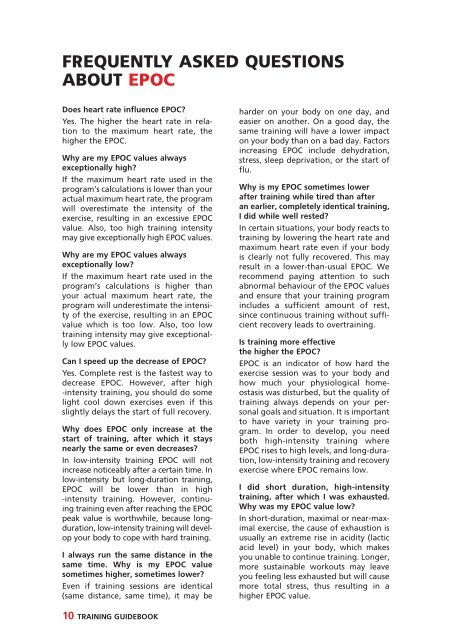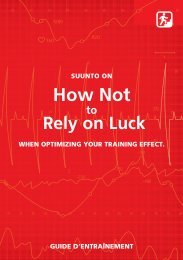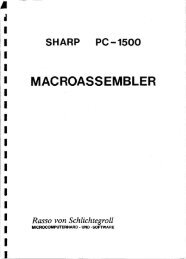Rely on Luck - Suunto
Rely on Luck - Suunto
Rely on Luck - Suunto
You also want an ePaper? Increase the reach of your titles
YUMPU automatically turns print PDFs into web optimized ePapers that Google loves.
FREQUENTLY ASKED QUESTIONS<br />
ABOUT EPOC<br />
Does heart rate influence EPOC?<br />
Yes. The higher the heart rate in relati<strong>on</strong><br />
to the maximum heart rate, the<br />
higher the EPOC.<br />
Why are my EPOC values always<br />
excepti<strong>on</strong>ally high?<br />
If the maximum heart rate used in the<br />
program’s calculati<strong>on</strong>s is lower than your<br />
actual maximum heart rate, the program<br />
will overestimate the intensity of the<br />
exercise, resulting in an excessive EPOC<br />
value. Also, too high training intensity<br />
may give excepti<strong>on</strong>ally high EPOC values.<br />
Why are my EPOC values always<br />
excepti<strong>on</strong>ally low?<br />
If the maximum heart rate used in the<br />
program’s calculati<strong>on</strong>s is higher than<br />
your actual maximum heart rate, the<br />
program will underestimate the intensity<br />
of the exercise, resulting in an EPOC<br />
value which is too low. Also, too low<br />
training intensity may give excepti<strong>on</strong>ally<br />
low EPOC values.<br />
Can I speed up the decrease of EPOC?<br />
Yes. Complete rest is the fastest way to<br />
decrease EPOC. However, after high<br />
-intensity training, you should do some<br />
light cool down exercises even if this<br />
slightly delays the start of full recovery.<br />
Why does EPOC <strong>on</strong>ly increase at the<br />
start of training, after which it stays<br />
nearly the same or even decreases?<br />
In low-intensity training EPOC will not<br />
increase noticeably after a certain time. In<br />
low-intensity but l<strong>on</strong>g-durati<strong>on</strong> training,<br />
EPOC will be lower than in high<br />
-intensity training. However, c<strong>on</strong>tinuing<br />
training even after reaching the EPOC<br />
peak value is worthwhile, because l<strong>on</strong>gdurati<strong>on</strong>,<br />
low-intensity training will develop<br />
your body to cope with hard training.<br />
I always run the same distance in the<br />
same time. Why is my EPOC value<br />
sometimes higher, sometimes lower?<br />
Even if training sessi<strong>on</strong>s are identical<br />
(same distance, same time), it may be<br />
harder <strong>on</strong> your body <strong>on</strong> <strong>on</strong>e day, and<br />
easier <strong>on</strong> another. On a good day, the<br />
same training will have a lower impact<br />
<strong>on</strong> your body than <strong>on</strong> a bad day. Factors<br />
increasing EPOC include dehydrati<strong>on</strong>,<br />
stress, sleep deprivati<strong>on</strong>, or the start of<br />
flu.<br />
Why is my EPOC sometimes lower<br />
after training while tired than after<br />
an earlier, completely identical training,<br />
I did while well rested?<br />
In certain situati<strong>on</strong>s, your body reacts to<br />
training by lowering the heart rate and<br />
maximum heart rate even if your body<br />
is clearly not fully recovered. This may<br />
result in a lower-than-usual EPOC. We<br />
recommend paying attenti<strong>on</strong> to such<br />
abnormal behaviour of the EPOC values<br />
and ensure that your training program<br />
includes a sufficient amount of rest,<br />
since c<strong>on</strong>tinuous training without sufficient<br />
recovery leads to overtraining.<br />
Is training more effective<br />
the higher the EPOC?<br />
EPOC is an indicator of how hard the<br />
exercise sessi<strong>on</strong> was to your body and<br />
how much your physiological homeostasis<br />
was disturbed, but the quality of<br />
training always depends <strong>on</strong> your pers<strong>on</strong>al<br />
goals and situati<strong>on</strong>. It is important<br />
to have variety in your training program.<br />
In order to develop, you need<br />
both high-intensity training where<br />
EPOC rises to high levels, and l<strong>on</strong>g-durati<strong>on</strong>,<br />
low-intensity training and recovery<br />
exercise where EPOC remains low.<br />
I did short durati<strong>on</strong>, high-intensity<br />
training, after which I was exhausted.<br />
Why was my EPOC value low?<br />
In short-durati<strong>on</strong>, maximal or near-maximal<br />
exercise, the cause of exhausti<strong>on</strong> is<br />
usually an extreme rise in acidity (lactic<br />
acid level) in your body, which makes<br />
you unable to c<strong>on</strong>tinue training. L<strong>on</strong>ger,<br />
more sustainable workouts may leave<br />
you feeling less exhausted but will cause<br />
more total stress, thus resulting in a<br />
higher EPOC value.<br />
10 TRAINING GUIDEBOOK








